Summary
Introduction to this chapter
The aim of this chapter is to introduce the context of training in library and information services. It begins with a general introduction to the aims and intended audience of this book, and some of the current issues faced by library trainers. This is followed by a section which looks at the links between training practice and the strategic goals and objectives of the library or information service. It is helpful for trainers to be aware of these connections, as the more effectively our training is aligned with the needs of the library and information service, the greater will be its contribution. It will also make it easier to access resources and support for training activities. The next section presents many of the benefits of training, and this is a useful list which may be edited as required by individual practitioners who are making a bid for training resources.
The training cycle is then outlined, and this involves four stages: planning, design, delivery and evaluation. This chapter considers the planning stage, and highlights the importance of working with a range of stakeholders to ensure that you develop an appropriate training plan (and one that meets the library and information service's strategic aims and objectives). Many library and information trainers become involved in training when they are asked to design and deliver specific training events or courses. These subjects, along with training evaluation, are dealt with in much greater depth elsewhere in this book.
There are a number of financial and legal issues associated with training, and so library and information trainers need to understand and follow their organization's policies and practices with respect to these subjects. In this chapter I have provided guidance on key themes and I recommend that individual trainers follow their own organization's practices and, as appropriate, obtain specialist advice. For independent and self-employed trainers, it is vital that you ensure that you develop effective financial practices, and your accountant will be able to advise you. In terms of legal advice, there are many government and other agencies that are able to help.
- Type
- Chapter
- Information
- The No-nonsense Guide to Training in Libraries , pp. 1 - 12Publisher: FacetPrint publication year: 2013



